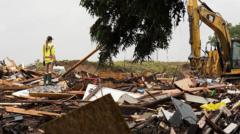The recent airstrike on June 23 by Israeli forces on Tehran’s Evin prison, known for its history of oppression, has sparked outrage across Iran, igniting a collective response that crosses political divides and even encompasses adversaries of the Iranian regime.
# U.S. Military Actions Against Iran Heighten Tensions in the Middle East

# U.S. Military Actions Against Iran Heighten Tensions in the Middle East
An aerial assault on Iran's notorious Evin prison raises international ire, uniting even dissenting voices within Iran against external aggression.
In the aftermath of the attack, debris has littered the prison grounds—a grim reminder of the deadly assault that claimed at least 79 lives, including innocents. For decades, Evin prison has been emblematic of the Iranian government's repression of dissent, with its walls lined with the stories of countless political prisoners.
The June strike, which resulted in significant damage to essential facilities, including the infirmary, has shifted the narrative surrounding Evin, transforming it from a site of fear into a focal point for anti-Israel sentiment, capturing the attention of both advocates for reform and those who oppose the existing regime.
Reports indicate diverse casualty profiles, with victims ranging from family members visiting inmates to legal professionals and young military conscripts. Each lost life strengthens the chorus of condemnation from within and outside Iran, as critics rally against what they view as unprovoked aggression.
As tensions simmer, the potential for further escalation looms large, with Iranian officials vowing to retaliate against perceived acts of aggression, while the international community grapples with the implications of regional instability. The airstrike on Evin prison may prove to be a pivotal moment in the ongoing cycle of violence, redefining relationships in the Middle East, and shaping the future dynamics between Iran and its adversaries.
The June strike, which resulted in significant damage to essential facilities, including the infirmary, has shifted the narrative surrounding Evin, transforming it from a site of fear into a focal point for anti-Israel sentiment, capturing the attention of both advocates for reform and those who oppose the existing regime.
Reports indicate diverse casualty profiles, with victims ranging from family members visiting inmates to legal professionals and young military conscripts. Each lost life strengthens the chorus of condemnation from within and outside Iran, as critics rally against what they view as unprovoked aggression.
As tensions simmer, the potential for further escalation looms large, with Iranian officials vowing to retaliate against perceived acts of aggression, while the international community grapples with the implications of regional instability. The airstrike on Evin prison may prove to be a pivotal moment in the ongoing cycle of violence, redefining relationships in the Middle East, and shaping the future dynamics between Iran and its adversaries.




















